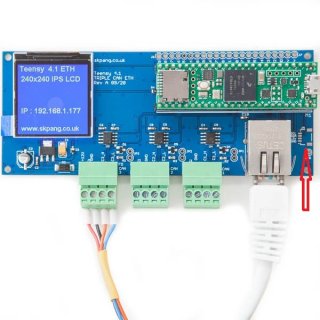// --------------------------------------
// i2c_scanner
// http://playground.arduino.cc/Main/I2cScanner
//
// Version 1
// This program (or code that looks like it)
// can be found in many places.
// For example on the Arduino.cc forum.
// The original author is not know.
// Version 2, Juni 2012, Using Arduino 1.0.1
// Adapted to be as simple as possible by Arduino.cc user Krodal
// Version 3, Feb 26 2013
// V3 by louarnold
// Version 4, March 3, 2013, Using Arduino 1.0.3
// by Arduino.cc user Krodal.
// Changes by louarnold removed.
// Scanning addresses changed from 0...127 to 1...119,
// according to the i2c scanner by Nick Gammon
// http://www.gammon.com.au/forum/?id=10896
// Version 5, March 28, 2013
// As version 4, but address scans now to 127.
// A sensor seems to use address 120.
// Version 6, November 27, 2015.
// Added waiting for the Leonardo serial communication.
//
//
// This sketch tests the standard 7-bit addresses
// Devices with higher bit address might not be seen properly.
//
#include <Wire.h>
// BUGBUG::Should put this in WireIMXRT.h
#if defined(__IMXRT1062__)
#define WIRE_IMPLEMENT_WIRE
#define WIRE_IMPLEMENT_WIRE1
#define WIRE_IMPLEMENT_WIRE2
#endif
typedef struct {
TwoWire *_wire;
const char * wire_name;
IMXRT_LPI2C_t * const port;
} wire_list_t;
wire_list_t wireList[] = {
{&Wire, "Wire", &IMXRT_LPI2C1}
#if defined(WIRE_IMPLEMENT_WIRE1)
, {&Wire1, "Wire1", &IMXRT_LPI2C3}
#endif
#if defined(WIRE_IMPLEMENT_WIRE2)
, {&Wire2, "Wire2", &IMXRT_LPI2C4}
#endif
#if defined(WIRE_IMPLEMENT_WIRE3)
, {&Wire3, "Wire3"}
#endif
};
const uint8_t wirelist_count = sizeof(wireList) / sizeof(wireList[0]);
void setup() {
// uncomment these to use alternate pins
//Wire.setSCL(16);
//Wire.setSDA(17);
for (uint8_t wirelist_index = 0; wirelist_index < wirelist_count; wirelist_index++) {
wireList[wirelist_index]._wire->begin();
}
Serial.begin(9600);
while (!Serial); // Leonardo: wait for serial monitor
Serial.println(F("\nI2C Scanner"));
}
void loop() {
byte error, address;
int nDevices;
for (uint8_t wirelist_index = 0; wirelist_index < wirelist_count; wirelist_index++) {
IMXRT_LPI2C_t * const port = wireList[wirelist_index].port;
Serial.print(F("Scanning("));
Serial.print(wireList[wirelist_index].wire_name);
Serial.println(F(")..."));
nDevices = 0;
for (address = 1; address < 127; address++) {
// The i2c_scanner uses the return value of
// the Write.endTransmisstion to see if
// a device did acknowledge to the address.
wireList[wirelist_index]._wire->beginTransmission(address);
error = wireList[wirelist_index]._wire->endTransmission();
if (error == 0) {
Serial.print(F("Device found at address 0x"));
if (address < 16) {
Serial.print("0");
}
Serial.print(address, HEX);
Serial.print(" (");
printKnownChips(address);
Serial.println(")");
nDevices++;
} else if (error == 4) {
Serial.print(F("Unknown error at address 0x"));
if (address < 16) {
Serial.print("0");
}
Serial.print(address, HEX);
Serial.printf("MCR:%x MSR:%x, MIER:%x MDER:%x MCFGR0:%x MDMR:%x MCCR0:%x\n",
port->MCR, port->MSR, port->MIER, port->MDER, port->MCFGR0, port->MDMR, port->MCCR0);
}
}
if (nDevices == 0) {
Serial.println(F("No I2C devices found\n"));
} else {
Serial.println(F("done\n"));
}
}
delay(5000); // wait 5 seconds for next scan
}
void printKnownChips(byte address)
{
// Is this list missing part numbers for chips you use?
// Please suggest additions here:
// https://github.com/PaulStoffregen/Wire/issues/new
switch (address) {
case 0x00: Serial.print(F("AS3935")); break;
case 0x01: Serial.print(F("AS3935")); break;
case 0x02: Serial.print(F("AS3935")); break;
case 0x03: Serial.print(F("AS3935")); break;
case 0x0A: Serial.print(F("SGTL5000")); break; // MCLK required
case 0x0B: Serial.print(F("SMBusBattery?")); break;
case 0x0C: Serial.print(F("AK8963")); break;
case 0x10: Serial.print(F("CS4272")); break;
case 0x11: Serial.print(F("Si4713")); break;
case 0x13: Serial.print(F("VCNL4000,AK4558")); break;
case 0x18: Serial.print(F("LIS331DLH")); break;
case 0x19: Serial.print(F("LSM303,LIS331DLH")); break;
case 0x1A: Serial.print(F("WM8731")); break;
case 0x1C: Serial.print(F("LIS3MDL")); break;
case 0x1D: Serial.print(F("LSM303D,LSM9DS0,ADXL345,MMA7455L,LSM9DS1,LIS3DSH")); break;
case 0x1E: Serial.print(F("LSM303D,HMC5883L,FXOS8700,LIS3DSH")); break;
case 0x20: Serial.print(F("MCP23017,MCP23008,PCF8574,FXAS21002,SoilMoisture")); break;
case 0x21: Serial.print(F("MCP23017,MCP23008,PCF8574")); break;
case 0x22: Serial.print(F("MCP23017,MCP23008,PCF8574")); break;
case 0x23: Serial.print(F("MCP23017,MCP23008,PCF8574")); break;
case 0x24: Serial.print(F("MCP23017,MCP23008,PCF8574")); break;
case 0x25: Serial.print(F("MCP23017,MCP23008,PCF8574")); break;
case 0x26: Serial.print(F("MCP23017,MCP23008,PCF8574")); break;
case 0x27: Serial.print(F("MCP23017,MCP23008,PCF8574,LCD16x2,DigoleDisplay")); break;
case 0x28: Serial.print(F("BNO055,EM7180,CAP1188")); break;
case 0x29: Serial.print(F("TSL2561,VL6180,TSL2561,TSL2591,BNO055,CAP1188")); break;
case 0x2A: Serial.print(F("SGTL5000,CAP1188")); break;
case 0x2B: Serial.print(F("CAP1188")); break;
case 0x2C: Serial.print(F("MCP44XX ePot")); break;
case 0x2D: Serial.print(F("MCP44XX ePot")); break;
case 0x2E: Serial.print(F("MCP44XX ePot")); break;
case 0x2F: Serial.print(F("MCP44XX ePot")); break;
case 0x33: Serial.print(F("MAX11614,MAX11615")); break;
case 0x34: Serial.print(F("MAX11612,MAX11613")); break;
case 0x35: Serial.print(F("MAX11616,MAX11617")); break;
case 0x38: Serial.print(F("RA8875,FT6206,MAX98390")); break;
case 0x39: Serial.print(F("TSL2561, APDS9960")); break;
case 0x3C: Serial.print(F("SSD1306,DigisparkOLED")); break;
case 0x3D: Serial.print(F("SSD1306")); break;
case 0x40: Serial.print(F("PCA9685,Si7021")); break;
case 0x41: Serial.print(F("STMPE610,PCA9685")); break;
case 0x42: Serial.print(F("PCA9685")); break;
case 0x43: Serial.print(F("PCA9685")); break;
case 0x44: Serial.print(F("PCA9685, SHT3X")); break;
case 0x45: Serial.print(F("PCA9685, SHT3X")); break;
case 0x46: Serial.print(F("PCA9685")); break;
case 0x47: Serial.print(F("PCA9685")); break;
case 0x48: Serial.print(F("ADS1115,PN532,TMP102,LM75,PCF8591")); break;
case 0x49: Serial.print(F("ADS1115,TSL2561,PCF8591")); break;
case 0x4A: Serial.print(F("ADS1115")); break;
case 0x4B: Serial.print(F("ADS1115,TMP102,BNO080")); break;
case 0x50: Serial.print(F("EEPROM,FRAM")); break;
case 0x51: Serial.print(F("EEPROM")); break;
case 0x52: Serial.print(F("Nunchuk,EEPROM")); break;
case 0x53: Serial.print(F("ADXL345,EEPROM")); break;
case 0x54: Serial.print(F("EEPROM")); break;
case 0x55: Serial.print(F("EEPROM")); break;
case 0x56: Serial.print(F("EEPROM")); break;
case 0x57: Serial.print(F("EEPROM")); break;
case 0x58: Serial.print(F("TPA2016,MAX21100")); break;
case 0x5A: Serial.print(F("MPR121")); break;
case 0x60: Serial.print(F("MPL3115,MCP4725,MCP4728,TEA5767,Si5351")); break;
case 0x61: Serial.print(F("MCP4725,AtlasEzoDO")); break;
case 0x62: Serial.print(F("LidarLite,MCP4725,AtlasEzoORP")); break;
case 0x63: Serial.print(F("MCP4725,AtlasEzoPH")); break;
case 0x64: Serial.print(F("AtlasEzoEC")); break;
case 0x66: Serial.print(F("AtlasEzoRTD")); break;
case 0x68: Serial.print(F("DS1307,DS3231,MPU6050,MPU9050,MPU9250,ITG3200,ITG3701,LSM9DS0,L3G4200D")); break;
case 0x69: Serial.print(F("MPU6050,MPU9050,MPU9250,ITG3701,L3G4200D")); break;
case 0x6A: Serial.print(F("LSM9DS1")); break;
case 0x6B: Serial.print(F("LSM9DS0")); break;
case 0x70: Serial.print(F("HT16K33")); break;
case 0x71: Serial.print(F("SFE7SEG,HT16K33")); break;
case 0x72: Serial.print(F("HT16K33")); break;
case 0x73: Serial.print(F("HT16K33")); break;
case 0x76: Serial.print(F("MS5607,MS5611,MS5637,BMP280")); break;
case 0x77: Serial.print(F("BMP085,BMA180,BMP280,MS5611")); break;
case 0x7C: Serial.print(F("FRAM_ID")); break;
default: Serial.print(F("unknown chip"));
}
}


